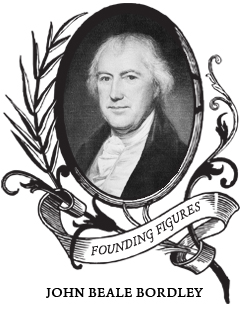Bordley, a Maryland attorney and planter, was the catalyst behind the founding of the Society. He was appointed as judge of the Provincial Court in Baltimore in 1766 and the following year as judge British Admiralty Court. When he inherited 1600 acres on Wye Island on the Chesapeake Bay through his first wife, Margaret Chew, he developed an extensive operation there that was self-sufficient. So interested was Bordley in experimenting with new ideas, following his knowledge of English farmers, that some have called his Wye Island farm an agricultural experiment station. Bordley was particularly skilled in crop rotation, and was aware of the value of clover in replenishing the soil. Consequently, his wheat production exceeded the norm. After his wife’s death, in 1776 he married a Philadelphia widow, Sarah Fishbourne Mifflin, and in 1783 became a member of the American Philosophical Society through which he found a group of men who were receptive to the idea of an agricultural society. While Bordley can be categorized as a gentleman farmer, he understood the science behind the revolutionized farming that was being practiced in England to the extent that he was invited to speak before the British Board of Agriculture in 1797 on “The Nature and Principles of Vegetation.” He understood that experimentation lost its value, he cautioned, if not carefully controlled and accurately documented. Many of his experiments are recorded in his two influential works’s Sketches on Rotation of Crops (1792) and Essays and Notes on Husbandry and Rural Affairs (1799).
John Beale Bordley

